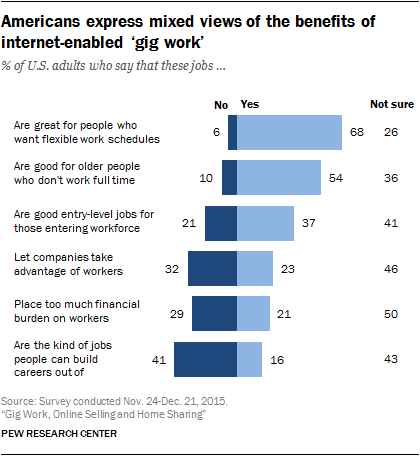The advent of technology has brought upon a major transformation in the way we work. The word “job” does not refer to a permanent position anymore as both employers and freelancers are looking for a no-strings-attached arrangement for procuring what they want.
The introduction of the gig economy has brought upon a massive change in the stake that freelancers hold in the market. A recent report by EY (formerly known as Ernst & Young), published in collaboration with Nasscom and FICCI, titled “Future Of Jobs In India: A 2022 Perspective”, reveals that Indian freelancers hold a 24% share of the global online gig economy. The report also says India is the third largest online labor market.

As far as the American market is concerned, freelancers are already beginning to make a dent in the market. According to the 2017 Freelancing in America study, an estimated 57.3 million Americans (that’s 36% of the entire workforce) participated in some kind of side-hustle, freelancing or gig work in 2017.
So, what does this mean for recruiters?
The gig economy can be a bigger deal for recruiters as they must now devise ways to keep up with the pace of the industry as well as identify the right talent. Advancements in technology have now given people the freedom to make money in unconventional ways. A large chunk of responsibility for the shift to the gig economy is the ascension of millennials into the workforce. A whopping 92% of the millennials prefer to work remotely. The rise of alternative employment options can imply that organizations and recruiters may need to rethink their hiring process. Recruiters could soon have a difficult time finding quality candidates as more shift into the gig economy.
What is the reason behind the sudden popularity of gig jobs?
Freelance and part-time jobs have not been uncommon in many industries. Most professionals in the art field like photographers, artists, designers, writers have been hired for temporary gigs and projects. However, the most surprising statistic is that more and more professionals are not moving to gig economies for economical reasons, but merely for the lifestyle it offers.
However, there are a few major reasons that led workers to the gig economy in the United States:
-
The rise of the Internet has led to a decrease in the connectivity gap between an organization and a professional. The Internet has essentially made freelancers discover gigs that enable them to work remotely from any corner in the world.
-
Freelance and part-time gigs also offer attractive pay and incentives for those looking for quick cash. Gig workers are generally paid on an hourly basis. Thus, the professional is aptly paid for the exact time he invests in the job.
-
The Great Recession of 2008 could have been the initial trigger for the shift to the gig economy, experts say. Following the Depression, organizations began to downsize and may laborers were forced to resort to freelance gigs as an “emergency option”. However, as mentioned earlier, over the last decade, millennials are beginning to view freelance gigs as more than just an emergency option and as a lifestyle by choice.
-
Some have also pointed to changes in health-care regulations and policies in the United States that may have encouraged companies to avoid hiring as many full-time workers as originally intended.
What are the benefits, according to the gig worker?
A recent survey by the Pew Research Center shows the factors that draw professionals to the gig economy. A huge majority, 68% of those surveyed, said gig work was great for people that want flexible work schedules. Meanwhile, 54% said freelancing is good for older people that do not want to work full time.

Despite the popular myth that freelance work is all for millennials, the Pew survey found that only 37% of people think gig work is good for entry-level jobs and 21% said it is not good for entry-level workers.Depending on the income slab a family falls under, work can be allocated in different ways. For example, low-income households are more likely to rely on gig work requiring manual labor, while wealthier families tend to be renting out their homes or selling handmade goods for extra income. The Roosevelt Institute put out a study recently that predicted that online freelance work will dilute hierarchy and de-centralize power in organizations in the future.In other words, the impact of technology has increased the efficiency and quality of remote work and has given smaller businesses the potent of competing with larger organizations. By 2040, the report says, workers will increasingly rely on a portfolio of short-term assignments rather than one job. This shift could boost overall productivity and the earnings for individuals, but those without entrepreneurial skills could get left behind.
Best hiring practices in the gig economy
As specified earlier, recruiters are being driven to innovate new strategies to find quality talent in the increasingly competitive industry. Though a majority of the gig workforce is characterized by workers between the ages of 18 and 34, statistics also show that 1 out of 3 Americans applying for gig roles are over the age of 50. This shows that the gig workforce goes beyond just freshers looking for some money.
Here are the top 5 tips you can leverage while hiring in the gig economy:
-
Make sure that you are absolutely certain about the freelance position that you are offering. This goes beyond just posting a job description on a talent site. Indulge in clear-cut internal communication about the frequency and the quality of the deliverables. Make sure to also have a backup for the role as loyalty can wear thin during high demand.
-
Leverage cutting-edge technology like Artificial Intelligence in your hiring process to track, identify and onboard temporary talent instantly. In an economy driven by temporary roles, organizations cannot afford to waste too much time or resources onboarding a single candidate.
-
Streamline your onboarding process to suit the role of a gig worker. Gig workers are hired for temporary roles and therefore, require quicker onboarding than the regular candidate.
-
Maintain open communication at all times. When you have a freelancer onboard, it is important that you keep them constantly updated of all the activities that transpire in the workplace. Remember: more engagement translates to higher loyalty.
-
Offer great packages and incentives. Employee experience plays a crucial role in retaining freelancers. Make sure that even if you outsource your deliverables, the freelancers are paid as per industry standards. Timely payment is an indicator of stability and will also guarantee higher chances of the candidate helping you out in the future.
How Gig Economy can help freelancers:
The booming popularity of the gig economy is not without reason. Gig economy offers tons of benefits to both the employer and the freelancer.

Here are a few reasons why you should embrace and be a part of the gig culture:
-
Offer services to multiple parties at the same time. The future of work is predicted to be portfolio-driven and not permanent. By rightly leveraging the gig economy, you can gain firsthand experience from different parallels.
-
Even if you aren’t planning to invest all your time freelancing, it can still prove to be a steady source of income and an interesting side-gig.
-
If you are a full-time gig worker, you can now invest your time in exploring interests of your own. Gig economy offers the perfect work-life balance that allows you to do a lot more than what you would normally expect at a full-time role.
Conclusion
Love it or hate it, The Gig Economy is going to take the hiring industry by storm. Recruiters, especially, need to brace themselves with strong strategies that will help them stay afloat in the era of digital nomads.
If you would like to know more about how talent acquisition works in the era of the gig economy, make sure to attend our upcoming webinar on the 20th of December. Watch experts demystify the best practices you can utilize to excel at hiring in the gig economy.
Unavailable for the webinar? Worry not! Just leave us your details here and we’ll be sure to send a recording to you!
References and statistics:
https://ideal.com/hiring-gig-economy/
http://www.pewinternet.org/2016/11/17/gig-work-online-selling-and-home-sharing/







Leave a Reply